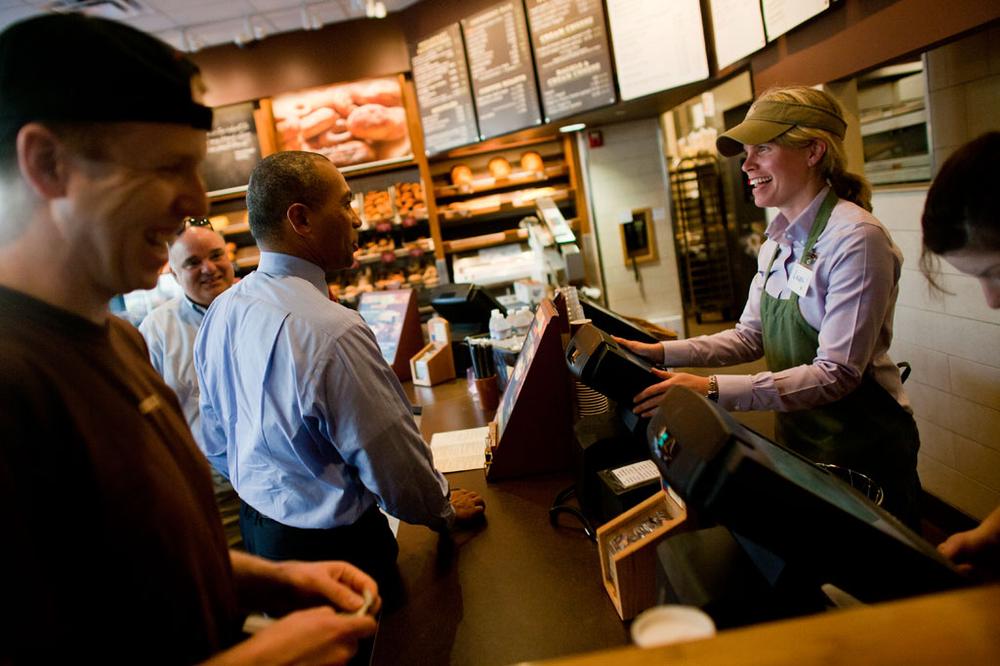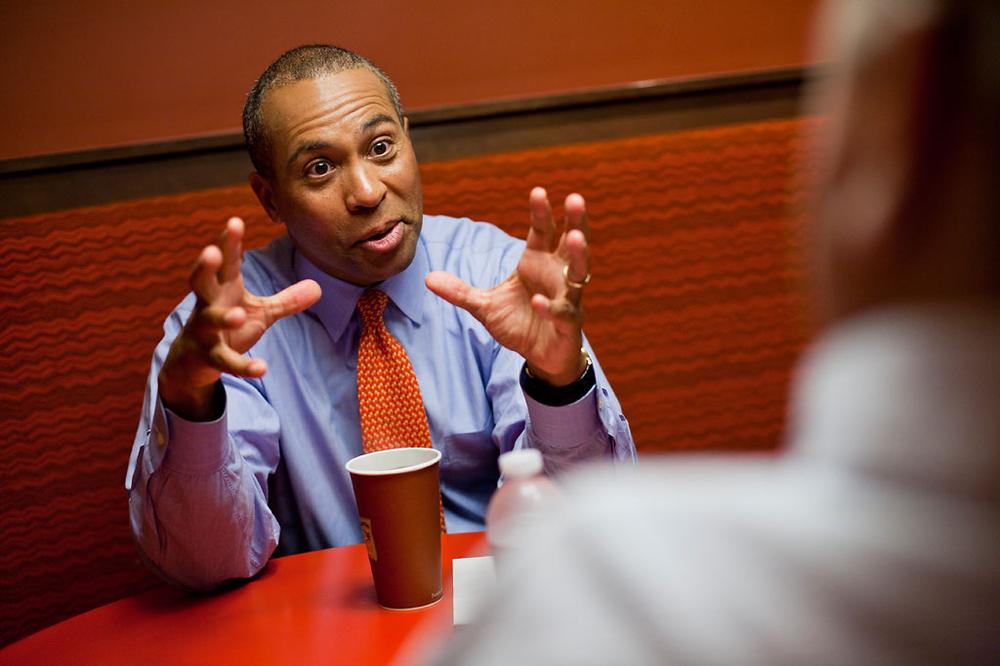Advertisement
The Home Stretch: Patrick Looks On The Bright Side

It's a seemingly simple question to ask the governor of Massachusetts: What is the job of the governor of Massachusetts?
"It's not just policy, I'll tell you that," says Deval Patrick, the man who currently holds — and is fighting to hold on to — that position. "It's leadership in the truest sense."
Sometimes, Patrick says, it's about growing jobs not by passing a piece of legislation, but by finding a way of getting two people to sit down together and cut a deal. And it's about showing up, he says, whether that means attending the funeral of a soldier killed overseas or the funeral of a child killed on the streets of this city.
The job of the governor is a question worth asking this election season, because it is one that Patrick's Republican challenger, Charlie Baker, might answer quite differently. The former CEO of Harvard Pilgrim Health Care has said he would run the commonwealth like he runs a business.
And while Patrick, speaking to us Tuesday over a grilled chicken salad at Panera Bread, down the street from our studios on Commonwealth Avenue, is quick to interject to say that he, too, values the business side of the job — "every governor has the responsibility to effectively run government" — he is also proud to say he looks beyond the numbers.
"If you're not governing with people in mind," he says, "not programs alone, not abstract policy, not the budget as a bunch of line items. If you're not governing with people in mind, I'm not really sure you're doing the job."
Patrick is asking Massachusetts voters to re-elect him at a time when "incumbent" and "Democrat" are not necessarily favored words. To people who say he has had his chance and that it's time for new leadership, Patrick runs through a list of accomplishments in his first four years in office:

"We capped state pensions and ended the abuse in the system, we enacted the most stringent ethics and lobbying rules in the country, we consolidated or eliminated more than 20 different agencies including the Turnpike Authority," he says.
"We put civilian flaggers at state construction sites, we doubled the charter school cap and created new accountabilities for public school teachers, we brought auto insurance rates down because of the introduction of competition, CORI reform, the autism bill, the school nutrition bill, the anti-bullying bill," he says.
Here in the heart of the Boston University campus, where many students' futures depend on the grades they receive, what grade does the governor think he should receive from voters on his first term in office?
Patrick laughs. "Oh, don't do that," he says, then ducks the question. "The grade I'm looking for is a vote on the second of November."
Advertisement
So does that make it an incomplete? "I don't know that, frankly, if it were complete, that I would run for a second term," he says. "This is not my career. The advantage of this not being my career is I can do my job without thinking about my career. I can do the job thinking about the long-term best interests of the commonwealth."
So on Day 1 of his second term, Patrick says, the focus would have to be on health care — and specifically on payment reform. The governor says he's proud of the work the state has done to improve access, but it is now essential to deal with what he calls the "unsustainable" cost of health care and the acceleration of that cost.
“It’s a strategy as old as the scripture, to take anxiety and whip it into anger and try to ride that in to office. I’m not about that."
Gov. Deval Patrick
"Just as we have lead here on access through our own health care reform," he says. "I think we can lead on cost containment as well."
At this point in the interview — and of the election season-- you've got to question this sort of unrelenting optimism. Does the governor worry that might sound out of touch to voters who are worried about their jobs and their futures and who are constantly hearing alarm bells in this year's campaign commercials?
"It's a strategy as old as the scripture, to take anxiety and whip it into anger and try to ride that in to office," he says. "I'm not about that. And I think that comes from how I grew up."
Growing up on welfare on the south side of Chicago, Patrick says there was plenty of anger around him and plenty of people who "blamed the man" for everything that was wrong in their lives. "But if all I'd learned back on the south side of Chicago is how to be angry," he says, "I think I'd still be on the south side of Chicago."
"What I learned from my grandparents and other constructive adults," he says, "was how to hope for the best and work for it — not just wishful thinking — but that the blend of optimism and effort is how you climb out of a hole."
Looking forward, Patrick predicts Massachusetts will become the international hub for the life sciences and biotech and the national hub for "clean tech" and a revived IT industry.
And what would Patrick like voters to say after another four years in office?
"We have the best schools in the country and some of the most accomplished and promising young people in the world," he says. "They are our future, and our future looks bright."
More:
This program aired on October 27, 2010.